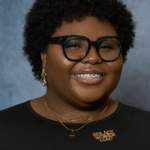Time and time again, our local, state, and national leaders work against the betterment of our youth by advocating for policies that make planning for a better future more complicated. From stripping access to comprehensive sexual health education to banning books in public libraries, our leaders are snatching knowledge more and more each day.
As a Black queer femme from the South, I have watched my elected officials twist and dilute the meaning of “quality education”— first as a K–12 student in South Carolina and later as an HBCU graduate. And nowhere are these attacks more dangerous than in the fight for Reproductive Justice.
Here’s the truth: most Historically Black Colleges and Universities (HBCUs) are located in the South or in conservative states — regions that are at the front lines of some of the most aggressive rollbacks of reproductive rights and gender justice protections in the nation. This means that Black students — particularly women, queer, and gender-expansive students — are attending school in environments where their rights are constantly under threat, and their access to basic health information is not guaranteed. Making broad and unsupported promises like the newest HBCU executive order, our nation’s leader is missing the vital importance of standing on business for our youth!
I remember being in seventh grade, excited for my first sex ed course. I imagined it would be inclusive, empowering, and informative. I wanted to be like HBO’s Sex and the City’s Carrie Bradshaw, except with a scientific twist leading TED Talks & programs. But what I received was a sanitized curriculum that focused on abstinence and treated LGBTQ people as only risk factors or tragic statistics. It was like someone had removed any talk of queerness, and what was left was filtered through the lens of disease and danger. Similarly, the erasure of Black women’s stories was prevalent (outside of stereotyping & personal bias from instructors). I learned quickly that my existence didn’t belong in the conversation.
College, I thought, would be different. And at both of my HBCUs, Hampton University and the University of the District of Columbia, it was. I finally had the chance to take classes like Human Sexuality and African American studies, dive into Black feminist literature, and learn about the Reproductive Justice (RJ) framework. The Reproductive Justice framework affirmed my identity and helped me make sense of the systemic gaps I’d experienced, especially in my reproductive health journey, living with Polycystic Ovarian Syndrome.
By sophomore year, I became a resident assistant and an intern for the Sexual Health Alliance, using both platforms to educate peers on STI testing, consent, sexual assault prevention, and the realities of queer sexual health. But not every student has this opportunity. Not every HBCU has students who are involved with reproductive/sexual health-related internships or institutional support for sexual health resources on campus, like free STI testing services or free emergency contraceptives. And not every campus is equipped, or willing, to embrace open conversations about sex, pleasure, gender identity, or reproductive autonomy.
That’s where fellowships like the Next Generation Leadership Institute fill these gaps on HBCU campuses. As the current Program Coordinator for the fellowship program, I support reproductive justice student leaders nationwide serving at their respective HBCUs. The fellowship, launched by In Our Own Voice: National Black Women’s Reproductive Justice Agenda, is designed to equip students with the resources, skills, and community needed to lead Reproductive Justice initiatives on their campuses. The Next Generation Leadership Institute fellows are tackling abortion stigma, advocating for contraceptive access, advocating for free menstrual products on campus, organizing voter education campaigns, and creating brave spaces for their fellow peers, all while juggling the academic and social pressures of college life.
They are leading in hostile policy environments. Many of these campuses exist in states where abortion is banned or severely restricted, sex ed is either nonexistent or misleading, and conversations about gender or racial justice are labeled as “indoctrination.” The political climate they are navigating is not just discouraging, it’s dangerous.
Yet despite these challenges, HBCU students are rising to the moment. They are not waiting for change; they are building it! They are creating peer education programs, demanding inclusive policies on their campuses, and advocating for resources in systems that have long tried to ignore their realities. Investing in Reproductive Justice fellowships at HBCUs is neither a luxury nor too much to ask for. It is a necessity.
These fellowships don’t just provide academic enrichment, they are lifelines. They are sources of knowledge, community, advocacy, and they often fill in the gaps that institutional resources cannot reach. Reproductive Justice programs are frequently the only structured opportunity for students to receive leadership development rooted in the lived experiences of Black women, queer people, and gender-expansive folks that highlight their significance and impact to the national policy front.
As someone who has walked this path, as a student eager to learn, an RA trying to educate, and now as a national RJ leader, I know how transformative this support can be. I know what it means to find your people and your purpose amid policies designed to make you invisible.
Our students are not just the future of Reproductive Justice. They are its present.
Let’s give them what they deserve: resources, recognition, and the freedom to lead boldly.
